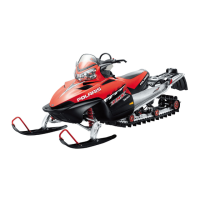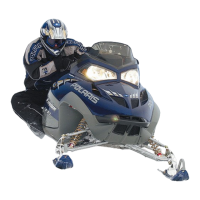ELECTRICAL
10.23
ALTERNATOR OUTPUT TEST
(AC
AMP)
Threetestscanbeperformedusingamultimeterto
determine the condition of the stator (alternator).
WHT
ORN
GRN
BLU
Y
Y/BRN
Y/R
BRN
TEST 1: Resistance Value of Each Stator Leg
1. Measure the resistance value of each of the three
stator legs:
Test
Connect Meter
Wires To:
Reading In
Ohms
Charge Coil YtoY/Red 0.31 Ω±20 %
Charge Coil YtoY/Brn 0.29 Ω±20 %
Charge Coil Y/RtoY/Brn 0.29 Ω±20 %
Charge Coil Y, Y/R, or Y/Brn
to Ground
Open (Infinity)
2. When measuring any of the Yellow wires to
ground, the reading should be infinite (open).
NOTE: If there are any significant variations in ohm’s
readings between the three legs; it is an indication that
one of the three stator legs maybe weak or failed.
TEST2: Resistance Valueof StatorLeg to Ground
1. Measure the resistance value of each of the stator
legs to ground: Y1 to Ground, Y2 to Ground, Y3 to
Ground. (See table in Test 1)
NOTE: Any measurement other than Infinity (open)
will indicate a failed or shorted stator leg.
TEST 3: Measure AC Voltage Ouput of Each
Stator Leg at Charging RPM
1. Set the selector dial to measure AC Voltage.
2. Start the engine and let it idle.
3. While holding the ATV at a specified RPM,
separately measure the voltage across each ’leg’
of the stator by connecting the meter leads to the
wires leading from the alternator (Y to Y/R, Y to
Brn, Y/R to Y/Brn).
4. Refer to the table below for approximate Voltage
AC readings according to RPM. Test each leg at
the specified RPM in the table. Example:The
alternator current output reading should be
approximately 13 Vac at 1300 RPM between
each ’leg’.
NOTE: If one or more of the stator leg output AC
voltage varies significantly from the specified value,
the stator may need to be replaced.
ATV RPM
Reading
AC Voltage (Vac)
Reading
1300 13 Vac ± 20 %
3000 32 Vac ± 20 %
5000 55 Vac ± 20 %
